“Keep the Autopilot Switch Off”: A Guide On Staying Active During a Game
Introduction
Hello PokeBeach, I am Mustafa Tobah and I am so happy to be writing for my favorite Pokemon site! I have been playing the video games and TCG for 10 years, but I only started playing the TCG competitively the past two years. In my first full season I managed to get 1st, 2nd, and top 8 at multiple City Championships and a top 32 at the Virginia Regional Championship. This season I was able to top cut almost every single City Championship and had good placings at multiple League Challenges. Sadly, my run ended right after State Championships so that I could focus on school, but I’m still quite involved!
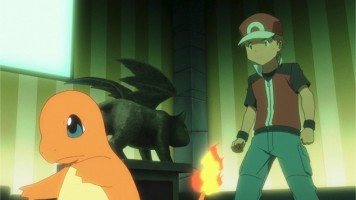 Anyway, that’s enough about me; it’s time to get into the article! This article is meant to show multiple methods for staying active when playing a game. Whenever you are in a game, it is important to not go into autopilot mode and just play without methodically thinking about every move. Every move you make could take you one step closer to a victory or a loss. The autopilot switch is very easy to turn on (see Red in Pokemon Origins), but that’s why I want to help you make sure it doesn’t happen!
Anyway, that’s enough about me; it’s time to get into the article! This article is meant to show multiple methods for staying active when playing a game. Whenever you are in a game, it is important to not go into autopilot mode and just play without methodically thinking about every move. Every move you make could take you one step closer to a victory or a loss. The autopilot switch is very easy to turn on (see Red in Pokemon Origins), but that’s why I want to help you make sure it doesn’t happen!
Mulligans
Whenever your opponent mulligans always look at their hand. A mulligan can reveal very important information about what deck they are playing and could influence your decisions. If you see Darkness Energy, you are probably playing against a Yveltal-EX-based deck. If you see Fighting Energy and Golbat, you are probably playing against Landorus-EX/Crobat. Mulligans can also reveal any strange tech cards that your opponent is playing, or it could show you their Ace Spec. This information can help you decide on what plays to make down the road as you will know what your opponent is limited to.
Knowing Your Prize Cards
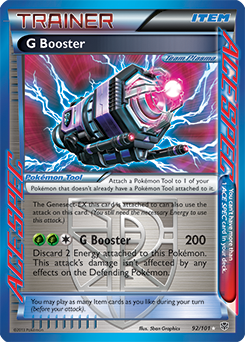
Something that you should always do the first time you search your deck is check what is in your Prize cards You do not have to investigate what all six of your Prizes are because that will usually take a lot of time, but check the important stuff. For example, if you are playing a Genesect-EX/Virizion-EX deck, check if your G Booster is prized and if any Genesect are prized. If you are playing Seismitoad-EX then check if any Hypnotoxic Laser are prized.
I cannot count how many times I have heard someone say something like “I only lost because one of my Yveltal was prized, if I knew, I would not have gone for that play.” If you know what you are limited to in a game then you can make the best plays possible. If you know that something is prized from the beginning of the game you can make decisions that divert from a strategy where you would normally need that card. Along with that, if you know you have multiple Supporters prized you could make a riskier play and hope you get a Supporter off of your Prizes because you know that you have a high chance of getting one. It can also help on future searches so that you don’t waste time searching for something that is prized.
A good way to build this habit is to check what your Prizes are in every game you play. If you do it every time you it will become a habit and it will be natural to do it in a tournament. Also, by doing it over and over again you will get faster and use up less time doing it. This process is very important and allows you to stay active and plan ahead by knowing what your options are limited to.
Check Your Opponent’s Discard
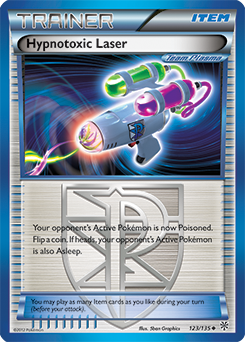
Your opponent’s discard is very important and can contain valuable information. As the game progresses it is important to know what your opponent has played and what they probably have left. Of course it is almost impossible to figure out exact card counts of your opponent’s deck, but by seeing what cards they have played you can get a good idea.
This is very important for when you make a play because you can try and figure out what your opponent can do in response. Before I make a play I always think to myself, “what is the most likely response from them?” I do this to see if my plan will have high odds to succeed. For example if they have already played 3 Hypnotoxic Laser, they probably will not have the forth one, so I can make a little riskier play because the odds of them getting the fourth Laser are low.
Checking your opponent’s discard became increasingly more important when they changed the tournament structure for States and Regionals to best-of-3 games. With this structure, you can check your opponents discard to get an approximate count of certain cards which will help you in the second and/or third game. If you are going to scoop the first game and move to the next, take an extra second to check their discard, so you will not be surprised by anything. Figure out what the limitations are to their deck and take advantage of that.
Check Your Own Discard
I know what you are probably thinking “how could I lose track of what I played?” or “I know how many ‘X’ I have left,” but mistakes happen. It even happens to me. I played Juniper looking for a Switch only to later realize that I already used them all. I got hung up on that decision and kept thinking back to how I should have just N’d my opponent instead and ended up losing the game. To avoid this situation, you should always check your discard and try to figure what would be the best option. If you only have one copy of that card left and your deck still has a lot of cards you would probably be better off using N to bring your opponents hand down then try and go for that one card. Obviously these decisions can change based on the situation, but I am just stating my general rule of thumb.
Watch What You Bench
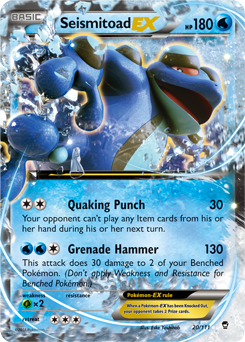
I always think of the Bench as a very important resource. You do not want to waste it by filling it up too soon, but you do not want to wait too long and get your Pokemon shuffled back in through an N. Deciding when to bench a Pokemon can be very tricky, but there are a few general rules that I like to follow.
The first is that I try to plan out what Prizes I want my opponent to take. If I am playing non-EX’s, then I try to put my opponent on odd Prizes and force them to take “seven prizes.” What I mean by this is that I have them take one KO on a non-EX and then three Knock Outs on EX’s so that the non-EX Prize is meaningless. To do this I watch how many “easy” Prizes I put down and I do not just bench every Pokemon I get in my hand. I usually try not to bench something like a Jirachi unless I really have to because I want to force my opponent to attack my main attackers.
Another rule I like to follow is that I do not like to bench a lot of things that are “Lysandre bait.” These are usually Pokemon that have high retreat cost or are not good attackers, so the opponent forces me to waste an Energy to retreat it. This is important for Seismitoad decks as I used to think that if I already have one Seismitoad down, then why not Bench another, but that is wrong. What happens is that I bench two and only attach Energy to one, so my opponent brings up the other one. This forces me to find another Double Colorless Energy which puts me in a risky situation because I could miss it and miss a turn of attacking. I believe that you should only bench it if you really need to, like when one is close to being Knocked Out or if you are afraid of it being shuffled back in by an N. The Bench is very important and is something that you actively want to think about when you use it. I always like to think ahead about how benching this Pokemon might affect the game in the future.
The Ideal Bench
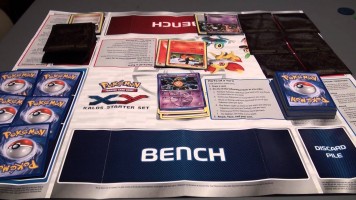 The ideal Bench is something that I like to think about before I play with a certain deck. I think to myself “In a perfect situation what would my Bench look like?” This way I can plan ahead and try to get as close as possible to achieving that ideal Bench.
The ideal Bench is something that I like to think about before I play with a certain deck. I think to myself “In a perfect situation what would my Bench look like?” This way I can plan ahead and try to get as close as possible to achieving that ideal Bench.
I learned this method through playing older formats, where Bench management was crucial. There were many important support Pokemon like Claydol from Great Encounters and Uxie from Legends Awakened and it was always important to find the balance between these support Pokemon and your main attackers.
This can of course be applied to this format with Pokemon like Crobat. Knowing how many Crobats to bench is very important, as you do not want too many to the point where you do not have enough room for your attackers. But you do not want too little to where you do not have enough to make an impact. I recommend trying to figure out how many you need of each Pokemon for each matchup before a tournament so you can go into the game knowing what you want and what you are doing.
Watch What Your Opponent Gets Off Their Searches
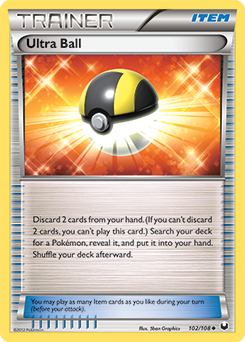
Whenever your opponent searches their deck, pay close attention to what they get because it could reveal valuable information about their deck. Try to look beyond just the card they got and think why they got it, or sometimes why they did not get anything.
If they search their deck using an Ultra Ball and they do not grab another Pokemon, you could start to think if they have any prized. For example, if your opponent is playing Genesect-EX/Virizion-EX and have only one Genesect down with a powered-up Virizion and they use an Ultra Ball, but do not grab another Genesect, it is probably safe to assume that the others are prized. This can be very helpful to you as you now know that all you have to do is deny your opponent any Prizes and just KO their only Genesect. If they run out of Genesect it will be very tough for them to win.
These assumptions can be very good, but they can also hurt you sometimes. Always have just a little doubt until the game progresses further and you fully know if it is true or not. I have made assumptions before that turned out to be wrong, which hurt me later on in the game, so be careful. Practice thinking about this and you will get better and better at catching those signs.
Watch What Your Opponent Plays From Their Hand
The last thing I want to mention is to watch for what your opponent plays from their hand. Especially with a card like N, it is very important to see if they play a Supporter. Most of the time you do not want to N your opponent when they did not play a Supporter the last turn because you do not want to give them a new hand when their current hand is probably not very good. You also have to watch out when your opponent has a big hand and they do not play anything. They could be holding on to a lot of good stuff or a bunch of junk. I usually like to N my opponent down to a low hand size when I can and continue to do that until they draw nothing. Always be weary of your opponent’s hand size and do not just focus on your own hand.
Conclusion
Playing without thinking and making decisions without being aware of what could happen can lead to bad situations. Always try to stay active when you are playing a game and maybe try some of the things I mentioned in this article. Thank you very much for reading my article and if you have any questions, disagree with anything, or have your own tips about how to avoid playing on “autopilot,” please comment below! :)
-Mustafa Tobah

